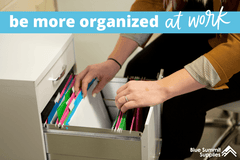In the age of always-on email, smartphones, and social media, the lines between work and home have blurred significantly over the years. Since most business professionals are connected to their work even when they’re not in the office, many people believe that the concept of “being on time for work” Is part of an old-school work ideology, but even in 2022, there are plenty of compelling reasons to commit to punctuality.
Why be on time for work?
Better collaboration
The less time spent in the office with your team and coworkers means the less valuable collaboration time you have. Being on time to work means that you can contribute in a more positive, productive way and feel proud of your accomplishment, as well as better support your team and your business.
Less stress
Business is driven by deadlines. Being late means you give yourself less time to work on projects and are at risk for missing deadlines or scrambling to make up time to meet deadlines. Being on time to work is the first step to helping you stay on track for projects and anything else that comes across your desk.
Better client relationships
If you work in a client-facing role, you have a duty to your customers or accounts to be available and accessible during normal business hours. Not being on time and running late can jeopardize these relationships if it’s hard for them to get questions answered or issues resolved with you due to tardiness.
More responsibility
Someone who can be trusted to get to work on time every day can also be trusted with more responsibility. People take notice of your time spent in the office and a track record of punctuality can help you grow in your career and even be a factor in earning promotions or other kinds of workplace recognition.
Better credibility
Relatedly, someone who is on time is viewed as someone who has a handle on things and can be trusted. It earns you more respect in the workplace and will ultimately lead to better relationships with everyone from coworkers to supervisors to vendors and clients.
Less guilt
Being on time consistently means you won’t have to feel guilty about leaving right on time at the end of the day to take a spin class, go to a doctor’s appointment, or do soccer practice drop off. Better planning for the beginning of your day means you can have more flexibility and peace of mind at the end of the day.
Always late for work? Create better habits to help you be on time every day.
Some people have accurate internal clocks that help them stay in sync for the day, ensuring timeliness. But for those who aren’t so lucky, there’s plenty you can do to help you stay on schedule. Here’s how to get better at time management to help you get to your desk on time.
Start – and stick with – a routine
If you’re always late to work, it’s important to start developing a strong routine. Most recent research points to the fact that it takes over 2 months for a habit to become automatic. Organizing a list and the steps around how to execute it will help you start strong and stay committed to the process.
Invest in a smart alarm clock
Getting to work on time starts with getting started with the day on time. Getting out of bed can be challenging, particularly if work life bleeds over into home life. A modern, interactive alarm clock– like a mat that doesn’t stop blaring until you step out bed and onto it or an alarm light that mimics a sunrise for a more natural wake-up experience – are effective ways to help people get out of bed on time.
Keep the season in mind
Getting to work on time often means traveling to a physical office. For those who don’t work from home and need to contend with traffic, there are several things that have an impact on your commute. Certain cities are known for their ability to draw in a bigger population seasonally, and this spike in people on the roads can make an average commute time much longer. Similarly, many public transportation options will add or remove scheduled stops to accommodate for weather or other seasonal changes. Paying attention to these details means you won’t be caught off guard and be late getting into the office.
Build a better commute
If part of your lateness is due to dragging your feet because you dread your morning commute, there are several steps you can take to make your commute less miserable and easier to start every day. Audiobooks and podcasts are a great way to remove some of the tedium from long drives or lengthy public transit rides. Taking the time to explore new routes and paths from your place to the office after work might give you better insight into which routes would be a better way to take at the beginning of your day.
Streamline your daily grab n’ go items
If you’re running around the house early in the morning trying to locate your phone, wallet, keys, and laptop or you’re turning around halfway to work to come back and grab essential items you forgot before you left, streamlining both what you bring to the office and where you keep it every day. Some people find that making sure they drop all their items in the same place – a bowl in the kitchen, the top of a bookcase, a stand in the entryway – is a good habit to get into to avoid the constant, time-consuming search for the everyday essentials.
Automate what you can
Simple changes can help save you time. Setting up the coffee maker to brew in the morning at the same time every day is one way to start automating your routine. Using in-home virtual assistants like Google Home or Amazon Alexacan help you start your day more organized – from reading out your calendar appointments and daily schedule to prep you mentally for your day or giving you weather updates for the day. These digital devices can even help you check on the status of your thermostat or if your lights are on or off, all to help you stay on track and keep you from scrambling.
Ask about a flexible schedule
Is it possible to move your starting time to later in the day? Ask your manager or HR team if there are flex-time options available to help structure the day in a way that works better for your schedule. That way you can guarantee an on-time arrival, consistency, and full, focused workday.
Restructure your day
If you’re trying to meet a hard start time in the office every day, try shifting around some of your morning responsibilities to the evening. If you’re normally responsible for dropping off the kids at school in the morning, see you can switch to do pickup instead. If you’re normally at a yoga class after getting up in the morning, see if your studio has a session you can check out after work. It’s possible to get just as much done every day by moving some things around in your schedule.
Establish better boundaries
It’s possible that having to answer late night emails or field texts from your boss at home are interrupting your sleep or interfering with your daily schedule enough to make getting out of the house and into the office every day a challenge. If you’re finding that you’re expected to be in your office before the office even opens and are still connected to your email or laptop long after you’ve left for the day, it’s likely that this kind of imbalance is going to have an effect on both your time management and work performance. Consider having a conversation with HR or your manager to discuss working hours. Explain that in order to be productive in the office, you need clear stopping hours at the end of the day or ask that the times you’ll be contacted after leaving the office for the day are limited to emergencies.
Being late can happen to any of us, but it doesn’t have to be a daily struggle. Sometimes, it takes time to build a routine and find the tools that work for you, but it’s completely possible to overcome always being late to work.
Got more questions about office culture? We’ve got answers. Check out our blog for more workplace resources, and follow us on Twitter, Instagram, and Facebook for updates. And, as always, if you have any questions, send us an email– Larry loves to hear from you.
 For more informative articles about office supplies, subscribe to our email newsletter!
For more informative articles about office supplies, subscribe to our email newsletter!
Never fear, you won't begin receiving daily sales emails that belong in a spam folder. Instead, we promise a fun weekly roundup of our latest blog posts and great finds from across the web. And if you lose interest, it's always easy to unsubscribe with a single click.










